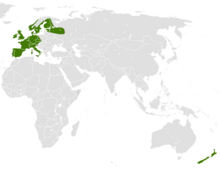Blonde hedgehog
| European hedgehog | |
|---|---|
 |
|
| Scientific classification | |
| Kingdom: | Animalia |
| Phylum: | Chordata |
| Class: | Mammalia |
| Order: | Eulipotyphla |
| Family: | Erinaceidae |
| Genus: | Erinaceus |
| Species: | E. europaeus |
| Binomial name | |
|
Erinaceus europaeus Linnaeus, 1758 |
|
 |
|
| Range including introductions | |
 |
|
| Native range of European hedgehog | |
The European hedgehog (Erinaceus europaeus), also known as the West European hedgehog or common hedgehog, is a hedgehog species found in Europe, from Iberia and Italy northwards into Scandinavia. It is a generally common and widely distributed species that can survive across a wide range of habitat types. It is a well-known species, and a favorite in European gardens, both for its endearing appearance and its preference for eating a range of garden pests. While populations are currently stable across much of its range, it is thought to be declining severely in Great Britain.
Erinaceus europaeus has a generalised body structure with unspecialised limb girdles. The animal appears brownish with most of its body covered by up to 6,000 brown and white spines. Length of head and body is ~160 mm (6.3 in) at weaning, increasing to 260 mm (10 in) or more in large adults. This species has an extremely short tail as an almost vestigial feature, typically 20 to 30 mm (0.79 to 1.18 in). Weight increases from around 120 g (4.2 oz) at weaning to > 1,100 g (2.4 lb) in adulthood. The maximum recorded weight is 2000 g (4.4 lb), though few wild specimens exceed 1,600 g (3.5 lb) even in autumn. Adult summer weight is typically somewhat less than in autumn, with an average of around 800 g (1.8 lb) and adult weights commonly as low as 500 g (1.1 lb). Males tend to be slightly larger than females, but sex differences in body weight are overshadowed by enormous seasonal variation.
E. europaeus is unlike any other creature across most of its range. Where it co-exists with the Northern white-breasted hedgehog (Erinaceus roumanicus), the two species are difficult to distinguish in the field, the latter having a white spot on its chest. According to the Guinness Book of World Records, E. europaeus is probably the largest species of hedgehog and is possibly the heaviest member of the Erinaceomorpha order, although the moonrat (Echinosorex gymnura), similar in average mass if not known to equal to the hedgehog's maximum weight, can attain a considerably greater length.
...
Wikipedia

